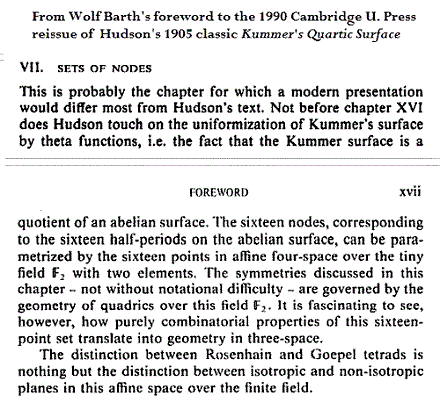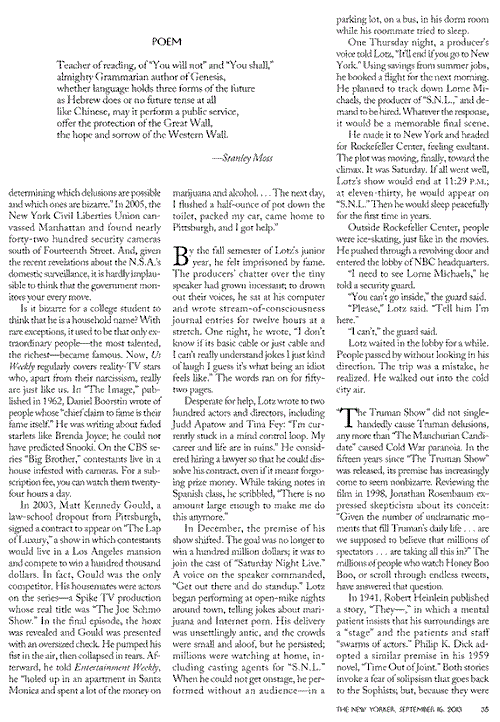Monday, September 30, 2013

For those who understand spoken Norwegian.
I do not. The interview apparently gives some
background on Lyche’s large wall version of
“The 2×2 Case (Diamond Theorem) II.
(After Steven H. Cullinane)” 2012
Size: 260 x 380 cm
See also this work as displayed at a Kjærlighet til Oslo page.
(Updated March 30, 2014, to replace dead Kjaerlighet link.)
Comments Off on Interview with Josefine Lyche
(Continued from High White Noon,
Finishing Up at Noon, and A New York Jew.)

Above: Frank Langella in "Starting Out in the Evening"
Below: Frank Langella and Johnny Depp in "The Ninth Gate"

"Not by the hair on your chinny-chin-chin."

Above: Detail from a Wikipedia photo.
For the logo, see Lostpedia.
For some backstory, see Noether.
Those seeking an escape from the eightfold nightmare
represented by the Dharma logo above may consult
the remarks of Heisenberg (the real one, not the
Breaking Bad version) to the Bavarian Academy
of Fine Arts.
Those who prefer Plato's cave to his geometry are
free to continue their Morphean adventures.
Comments Off on A Line for Frank
For the title, see the end of yesterday's post "For Michaelmas."
See also the Sept. 22 post Incarnation, Part 2
as well as Noether in this journal.
Comments Off on Theologia Mathematica
The title is a reference to an article on page SR4 of
The New York Times Sunday Review on Michaelmas.
From Wired , a Saturday evening post —
(Click to enlarge.)

From a Breaking Bad recap by Logan Hill—
“I am not in danger, Skyler, I am the danger,” Walt growls,
in an electric shock of a scene that likely marks the beginning
of a new phase of Breaking Bad . If this show has been the story
of Walt’s deliberate, step-by-step descent into the bottom of
some bleak moral valley, this is him charging madly downhill
into darkness. “A guy opens his door and gets shot, you think
that of me? No, I am the one who knocks .”

Talk amongst yourselves.
Comments Off on Knock, Knock, Knockin’
Sunday, September 29, 2013
Comments Off on Bavarian Gentians

The date of the above meditations was suggested by that of the post
"Theologia Mathematica" in the weblog The World of Dr. Justice .
Comments Off on For Michaelmas
Today, beginning at about 11 AM ET, I checked out
the latest news from Oslo artist Josefine Lyche,
often mentioned in these posts.
Lyche's Facebook page has a new cover photo—
geometric diagrams from Order in Space , a 1969
book by Keith Critchlow.
A search for more information on Critchlow yielded
information on his friend the impressive Kathleen Raine,
who reportedly died at 95 on July 6, 2003.
See also references to that date in this journal.
From Raine's obituary in The Guardian :
"When asked how she wished people
to remember her, Kathleen Raine said
she would rather they didn't. Or that
Blake's words be said of her: 'That in
time of trouble, I kept the divine vision.' "
Comments Off on Church with Josefine
Saturday, September 28, 2013
Legendary Magician John Calvert Dies at 102
The Hollywood Reporter , 8:36 PM PDT 9/27/2013
by Mike Barnes —
" 'Out in Hollywood many years ago, Danny Kaye was
in my show and came out and impersonated Hitler,'
Calvert said in a 1998 interview. 'Then the Marines
would come out and grab him and put him in the buzz saw
and we’d cut his head off, put his head in a sausage grinder,
and out came German wieners!' "
See MAX in the posts of September 9th.

"Calvert died Friday [Sept. 27] in Lancaster, Calif., according to
The International Brotherhood of Magicians."
See also The Carlin Code (May 12, 2006).
Comments Off on Wiener News
(Where Entertainment Is God , continued)
Yesterday's evening numbers in the New York Lottery
were 007 and 3856. You are free to supply your own
interpretation of the former. The latter may, if you like,
be interpreted as post 3856, The Illuminati Stone .
Some context:
(Click for a larger, clearer image.)

I prefer Richard Brautigan.
Comments Off on Castle Rock Entertainment
Friday, September 27, 2013
"Let X equal the month of full bookstores."
— Proof by David Auburn
"Harvard Book Store is thrilled to welcome Stephen King
for a special event to celebrate the release of Doctor Sleep ,
the long-anticipated sequel to 1977’s The Shining .
Mr. King will read from and discuss the new book,
followed by a Q&A with the audience at Memorial Church
in Harvard Yard on September 27."
|
See as well Corpse + Eliot and some remarks
on the mathematics of Kummer
from this September and from last September.
Comments Off on Proof (continued)

See yesterday's post Design Mastery and a post for Amy Adams's birthday in 2011
on Eliot's still point and the dance .
Comments Off on For Amy “Big Eyes” Adams
Thursday, September 26, 2013

For T.S. Eliot on his birthday, a film review—
"… the Coens are… elegantly asserting design mastery…."
— Peter Bradshaw, review of "Inside Llewyn Davis"
in The Guardian on May 18, 2013
Related material— Two Log24 posts from that date—
Black Hole Revisited and Midnight in Bakhtin.
The former post presents a Jewish approach to
Eliot's concept of time and "the still point."
The latter post presents a more sophisticated approach.
Perhaps the Coens' design mastery extends to the phrase
"time stops" of Kerouac. See the remarks by Dean Moriarty
in On the Road quoted here in the previous post (Sept. 24).
The Coens' film contains, Bradshaw says, "a smoulderingly
Kerouac-y poet, played by Garrett Hedlund." Hedlund played
not Kerouac, but Moriarty, in the 2012 film of On the Road .
Comments Off on Design Mastery
Tuesday, September 24, 2013
“It’s not the tune that counts but IT.”
— Dean Moriarty in On the Road

Comments Off on Being, IT, and Moriarty
For the late Carolyn Cassady, once a wife of Neal Cassady
(Dean Moriarty of Jack Kerouac's classic novel On the Road ).
She reportedly died at 90 in England on Friday, September 20,
2013.
From a post in this journal on the night of September 20-21,
with waning Harvest Moon:

Click on "Aooo" for some related posts, tagged "Howl."
Comments Off on Sleep Tale
Monday, September 23, 2013
"… It raced down the gossamer curtain of Its webbing,
a nightmare Spider from beyond time and space,
a Spider from beyond the fevered imaginings of
whatever inmates may live in the deepest depths of hell.
No, Bill thought coldly, not a Spider either, not really,
but this shape isn’t one It picked out of our minds;
it’s just the closest our minds can come to
(the deadlights)
whatever It really is."
— Stephen King, It (Sept. 15, 1986)
Related horror by Fritz Leiber—
"The Mind Spider" and "Damnation Morning."
Related fiction by Mark Helprin—
In Sunlight and in Shadow .
As a perceptive reviewer has noted, Helprin's title is
almost a verse from the song "Danny Boy."
See, too, the Danny Boy of The Shining ,
who returns tomorrow in a sequel, Doctor Sleep .
"The summer's gone and all the roses falling…."
Comments Off on For Danny Boy
Sunday, September 22, 2013
From yesterday —
"… a list of group theoretic invariants
and their geometric incarnation…"
— David Lehavi on the Kummer 166 configuration in 2007
Related material —

"The hint half guessed, the gift half understood, is Incarnation."
— T. S. Eliot in Four Quartets
"This is not theology; this is mathematics."
— Steven H. Cullinane on four quartets
To wit:

Click to enlarge.
Comments Off on Incarnation, Part 2
Saturday, September 21, 2013
The Kummer 166 configuration is the configuration of sixteen
6-sets within a 4×4 square array of points in which each 6-set
is determined by one of the 16 points of the array and
consists of the 3 other points in that point's row and the
3 other points in that point's column.
See Configurations and Squares.
The Wikipedia article Kummer surface uses a rather poetic
phrase* to describe the relationship of the 166 to a number
of other mathematical concepts — "geometric incarnation."

Related material from finitegeometry.org —

* Apparently from David Lehavi on March 18, 2007, at Citizendium .
Comments Off on Geometric Incarnation
Mathematics:
A review of posts from earlier this month —
Wednesday, September 4, 2013
Unexpected connections between areas of mathematics
previously thought to be unrelated are sometimes referred
to as "moonshine." An example— the apparent connections
between parts of complex analysis and groups related to the
large Mathieu group M24. Some recent work on such apparent
connections, by Anne Taormina and Katrin Wendland, among
others (for instance, Miranda C.N. Cheng and John F.R. Duncan),
involves structures related to Kummer surfaces .
In a classic book, Kummer's Quartic Surface (1905),
R.W.H.T. Hudson pictured a set of 140 structures, the 80
Rosenhain tetrads and the 60 Göpel tetrads, as 4-element
subsets of a 16-element 4×4 array. It turns out that these
140 structures are the planes of the finite affine geometry
AG(4,2) of four dimensions over the two-element Galois field.
(See Diamond Theory in 1937.)
Thursday, September 5, 2013
(Continued from yesterday)
The foreword by Wolf Barth in the 1990 Cambridge U. Press
reissue of Hudson's 1905 classic Kummer's Quartic Surface
covers some of the material in yesterday's post Moonshine.

The distinction that Barth described in 1990 was also described, and illustrated,
in my 1986 note "Picturing the smallest projective 3-space." The affine 4-space
over the the finite Galois field GF(2) that Barth describes was earlier described—
within a 4×4 array like that pictured by Hudson in 1905— in a 1979 American
Mathematical Society abstract, "Symmetry invariance in a diamond ring."
"The distinction between Rosenhain and Goepel tetrads
is nothing but the distinction between isotropic and
non-isotropic planes in this affine space over the finite field."
The 1990 paragraph of Barth quoted above may be viewed as a summary
of these facts, and also of my March 17, 2013, note "Rosenhain and Göpel
Tetrads in PG(3,2)."
|
Narrative:

Aooo.
Happy birthday to Stephen King.
Comments Off on Mathematics and Narrative (continued)
Thursday, September 19, 2013


Midrash: Butterfly and Bee.
Comments Off on Bugs
Wednesday, September 18, 2013
An LA obituary online yesterday suggests
a review of Kabbalah in this journal.
See also the final link in last weekend's
Log24 post Sunday Shul.
Comments Off on Review
Tuesday, September 17, 2013
(Continued)
Google News this morning —

For some remarks in greater depth, see
"In the Neighborhood of Mathematical Space,"
by Karen Shenfeld (1993).
Comments Off on Occupy Space
Chess lyrics, "Quartet" —
"A model of decorum and tranquillity
Become like any other sport
A battleground for rival ideologies
To slug it out with glee"
Communist leader Chin Peng, 88,
reportedly died in Bangkok yesterday.
"Is a puzzlement."
Comments Off on One Knight in Bangkok
Monday, September 16, 2013
Comments Off on A Word to the Wise

The above news item seems to exemplify Baudelaire's (and Murdoch's)
notion of contingency —
|
"La modernité, c’est le transitoire, le fugitif, le contingent, la moitié de l’art, dont l’autre moitié est l’éternel et l’immuable."
— Baudelaire, "Le Peintre de la Vie Moderne," IV (1863)
"By 'modernity' I mean the ephemeral, the fugitive, the contingent, the half of art whose other half is the eternal and the immutable."
— Baudelaire, "The Painter of Modern Life," IV (1863), translated by Jonathan Mayne (in 1964 Phaidon Press book of same title)
|
Thanks to the late Marshall Berman for pointing out this remark of Baudelaire.
(All That Is Solid Melts Into Air , Penguin edition of 1988, p. 133)
* For this post's title, see Language Game in this journal on 9/11,
the morning of Berman's reported death.
Comments Off on Fleur de Derrida*
Sunday, September 15, 2013
Comments Off on Babble On
Suggested by a poem in the current New Yorker.
Today's text —
"We have no more beginnings.
Incipit : that proud Latin word
which signals the start
survives in our dusty 'inception'."
— George Steiner, beginning of
Grammars of Creation
Reply in the Latin tradition—
 .
.
Cast
(From the Log24 posts
of August 23-24, 2013)
Comments Off on Sermon
See Hollywood + Vine in this journal.
See also Jews on Fiction.
Comments Off on Sunday Shul
Saturday, September 14, 2013
(Continued)
"Motifs bleed off the edge of one Pynchon canvas
onto the next." — Review of Bleeding Edge in
tomorrow's New York Times Sunday Book Review
A RIDDLE for the Church of St. Frank:

AN ANSWER:

The red carpet is prepared for the 2013 Oscars at the Dolby Theatre.
Comments Off on Where Entertainment Is God
Thursday, September 12, 2013
"Agilizamos y automatizamos
el registro de su evento."
— Gamalog.mx
"… que cantaba el rey David."
Comments Off on A Beginning

* For the Church of St. Frank —
The above item from the 9/11 NY Times obituaries, and the
Log24 posts of Monday, Sept. 9.
Comments Off on The Sense of an Ending*
Wednesday, September 11, 2013
Eisenman I: DuBois, PA (Of German descent)
Eisenman II: Yale (Apparently related to Eisenman I)
Eisenman III: Newark, NJ (Jewish)
"Confusion is nothing new." — Song lyric
Comments Off on The Eisenman Chronicles
In reply to "Poem," by Stanley Moss, in
the Sept. 16, 2012, New Yorker —
"Then we take Berlin." — Phrase by Leonard Cohen
See also this morning's 9:29 post Language Game.
Comments Off on Poem
In which Plato continues to thank the Academy.
From the Academy, a lead balloon for 9/11 —
continued from March First, 2002.
A search today for the name Eisenman
(see previous post) yields the following :
"We need a cameo from Plato, a safecracker,
a wrinkle or two to be ironed out, some ice,
some diamonds, and, above all, laughter
for this irony of ironies."
— Jeffrey Kipnis, "Twisting the Separatrix,"
Assemblage No. 14, April 1991, MIT Press
Comments Off on Language Game
Continued from September 3rd, 2013.
On that date, there were two posts in this journal:
"The Stone" today suggests…"* and
"An End in Itself."
The former dealt with some philosophy and
mathematics related to graphic design.
The latter dealt with death and finality.
The New York Times today has an obituary
that, revisiting Sept. 3rd, unites the topics of
death and design.
|
Alvin Eisenman,
Graphic Design Educator,
Dies at 92
By DANIEL E. SLOTNIK
Published: September 10, 2013
Alvin Eisenman, a graphic designer who in 1951 became the first director of Yale’s graduate program for graphic design, the first offered by a major American university, died on Sept. 3 at his home, which he also designed, on Martha’s Vineyard. He was 92. More>>
|
For greater depth, see the American Institute of Graphic Arts.
* This post's title and "The Stone" above refer to the New York Times
philosophy column "The Stone"— In particular, to its Sept. 2nd post
"Women in Philosophy? Do the Math."
Comments Off on A Girl’s Best Friend?*
Tuesday, September 10, 2013
"A version of this review appears in print
on September 11, 2013,
on page C1 of the New York edition…."
— The New York Times online this evening
Comments Off on Kakutani on Pynchon
The following page from the Sept. 16, 2013, issue of The New Yorker
deals with current trends in paranoid schizophrenia. It may interest
fans of Philip K. Dick.
(Click for a larger, clearer image.)

As for the poem by Stanley Moss on the above page (35, by the way),
a quote from Wallace Stevens seems appropriate —
"It was a language he spoke, because he must, yet did not know.
It was a page he had found in the handbook of heartbreak."
For the "wall" theme of Moss, see (for instance), this journal
on June 3, 2013 — New Yorker Art.
"All in all…." — Pink Floyd
Comments Off on Moss on the Wall
Monday, September 9, 2013
Poster shown here last night —

Politics this afternoon —

Comments Off on ART WARS Midrash

For the late Billy Wilder, director of Ace in the Hole (1951)

Click image for a larger version.
See, too, this morning's quarter-to-three post, and The Vikings (1958)—

The art by Josefine Lyche in the Bodin book shown
above is, as the artist notes, based on my own work.
Comments Off on Viking Book
Some random thoughts suggested by the Norwegian ice hole
in the opening scene of the 2012 film Kon-Tiki .
From a Log24 post of August 2, 2013—

See, too, the secret life of Marsden Hartley :

Comments Off on Ace in the Hole
For the star of Platoon —

* Continued from July 28, 2011.
Comments Off on Winning*
Sunday, September 8, 2013

For John Cusack and Menno Meyjes —
"I still haven't found what I'm looking for." — Bono
"In fact Surrealism found what it had been looking for
from the first in the 1920 collages [by Max Ernst],
which introduced an entirely original scheme of visual structure…."
— Rosalind Krauss quoting André Breton*
in "The Master's Bedroom"
See also tonight's 10 PM post.
* "Artistic Genesis and Perspective of Surrealism" (1941),
in Surrealism and Painting (New York, Harper & Row, 1972, p. 64).
Comments Off on The Importance of Being Ernst
(Continued)


* The title and displayed time of this post is a fudge.
The post was actually put online at about 10:02 PM.
A surreal interpretation of that time as the date 10/02
yields a post from last October related to
this evening's previous post.
Comments Off on It’s 10 PM*

"Take a cube, and write the numbers 1,…,6 on its faces.
Now the pairs of numbers on opposite faces
form a syntheme. (Standard dice, for example, represent
the syntheme 12|34|56.) "
— Peter J. Cameron, weblog post of May 11, 2010
"For every kind of vampire, there is a kind of cross."
— Gravity's Rainbow

Comments Off on Crosses for Sherlock
Saturday, September 7, 2013
(Continued from May 4, 2013)
"I saw a werewolf with a Chinese menu in his hand
Walking through the streets of Soho in the rain"
— Warren Zevon

"It is well
That London, lair of sudden
Male and female darknesses,
Has broken her spell."
— D. H. Lawrence in a poem on a London blackout
during a bombing raid in 1917. See also today's previous
posts, Down Under and Howl.
Backstory— Recall, from history's nightmare on this date,
the Battle of Borodino and the second London Blitz.
Comments Off on Structure and Character
"If I am to have a meeting it shall be down,
down in the invisible,
and the moment I re-emerge
it shall be alone.
In the visible world I am alone, an isolate instance.
My meeting is in the underworld, the dark."
— D. H. Lawrence, Kangaroo , Chapter 7,
"The Battle of Tongues."
The web edition of this book says it was
"Last updated Tuesday, June 18, 2013."
This was also the publication date of Max Barry's
2013 novel Lexicon . (See that date in this journal.)
Comments Off on Down Under
Friday, September 6, 2013
"A vast space that travels down to the bedrock
upon which the towers were built, the museum
winds its way deeper and deeper underground,
taking visitors on a journey to the very bottom."
— The Associated Press in
this evening's Washington Post
This suggests a review of a different sort of
bedrock:—

"If you have built castles in the air,
your work need not be lost;
that is where they should be.
Now put the foundations under them.”
— Henry David Thoreau
Comments Off on Space
(Continued)
"Born of blood and tribulation"
— Gangs of New York

"Oblivion is not to be hired: The greater part must be content
to be as though they had not been, to be found in the Register
of God, not in the record of man."
— Sir Thomas Browne
The part of the above quotation preceding the first comma may be
found, among other places, in a New York Times piece published
online on August 7, 2012. See also this journal on that date.
Comments Off on Oblivion
Thursday, September 5, 2013
Underworld and Evolution
This journal on 9/11, 2009 —

Poster for Kate Beckinsale in a film
released on 9/11, 2009 —

For Qohen Leth — A quotation from
this journal on 9/11, 2009 —
"Time and chance
happeneth to them all."
— Ecclesiastes 9:11
Comments Off on An Effective Team:
"The yarns of seamen have a direct simplicity, the whole meaning
of which lies within the shell of a cracked nut. But Marlow was not
typical (if his propensity to spin yarns be excepted), and to him the
meaning of an episode was not inside like a kernel but outside,
enveloping the tale which brought it out only as a glow brings out a
haze, in the likeness of one of these misty halos that sometimes
are made visible by the spectral illumination of moonshine."
— Joseph Conrad in Heart of Darkness
Kernel — See Nocciolo.
Glow — See Moonshine and Moonshine II.
See also Cold Open (Jan. 29, 2011) and
Where Entertainment is God (Aug. 25, 2013).
Comments Off on Kernel and Glow
(Continued from yesterday)
The foreword by Wolf Barth in the 1990 Cambridge U. Press
reissue of Hudson's 1905 classic Kummer's Quartic Surface
covers some of the material in yesterday's post Moonshine.

The distinction that Barth described in 1990 was also described, and illustrated,
in my 1986 note "Picturing the smallest projective 3-space." The affine 4-space
over the the finite Galois field GF(2) that Barth describes was earlier described—
within a 4×4 array like that pictured by Hudson in 1905— in a 1979 American
Mathematical Society abstract, "Symmetry invariance in a diamond ring."
"The distinction between Rosenhain and Goepel tetrads
is nothing but the distinction between isotropic and
non-isotropic planes in this affine space over the finite field."
The 1990 paragraph of Barth quoted above may be viewed as a summary
of these facts, and also of my March 17, 2013, note "Rosenhain and Göpel
Tetrads in PG(3,2)."
Comments Off on Moonshine II
Wednesday, September 4, 2013
Margalit Fox in The New York Times this evening—
Judith Daniels, the founding editor in chief of Savvy ,
the first glossy magazine aimed at executive women,
died on Sunday at her home in Union, Me. She was 74….
“Savvy will not tell you how to be a good secretary,”
one of its early promotional fliers read. “Savvy will tell you
how to hire a good secretary— and how to fire.”
From the date of Daniels' death: The Crossword Omen.
See, too, Vogue in this journal and Ontology.
From a post of January 26, 2013—

Sally in the 2013 film Oblivion : "Are you an effective team?"

Comments Off on Secretary
Unexpected connections between areas of mathematics
previously thought to be unrelated are sometimes referred
to as "moonshine." An example— the apparent connections
between parts of complex analysis and groups related to the
large Mathieu group M24. Some recent work on such apparent
connections, by Anne Taormina and Katrin Wendland, among
others (for instance, Miranda C.N. Cheng and John F.R. Duncan),
involves structures related to Kummer surfaces .
In a classic book, Kummer's Quartic Surface (1905),
R.W.H.T. Hudson pictured a set of 140 structures, the 80
Rosenhain tetrads and the 60 Göpel tetrads, as 4-element
subsets of a 16-element 4×4 array. It turns out that these
140 structures are the planes of the finite affine geometry
AG(4,2) of four dimensions over the two-element Galois field.
(See Diamond Theory in 1937.)
A Google search documents the moonshine
relating Rosenhain's and Göpel's 19th-century work
in complex analysis to M24 via the book of Hudson and
the geometry of the 4×4 square.
Comments Off on Moonshine
Tuesday, September 3, 2013
Continued from August 29th
"The general mood was summed up by fan
Debra Kay, who tweeted simply: 'R.I.P. Frederik Pohl.
Thanks for the stories.'" — The Guardian today
Pohl reportedly died Monday.
A synchronicity check: Quoted here Monday—

See also this journal on August 5th, 2008—

Comments Off on An End in Itself
A girl's best friend?
|
The Philosopher's Gaze , by David Michael Levin,
U. of California Press, 1999, in III.5, "The Field of Vision," pp. 174-175—
The post-metaphysical question—question for a post-metaphysical phenomenology—is therefore: Can the perceptual field, the ground of perception, be released from our historical compulsion to represent it in a way that accommodates our will to power and its need to totalize and reify the presencing of being? In other words: Can the ground be experienced as ground? Can its hermeneutical way of presencing, i.e., as a dynamic interplay of concealment and unconcealment, be given appropriate respect in the receptivity of a perception that lets itself be appropriated by the ground and accordingly lets the phenomenon of the ground be what and how it is? Can the coming-to-pass of the ontological difference that is constitutive of all the local figure-ground differences taking place in our perceptual field be made visible hermeneutically, and thus without violence to its withdrawal into concealment? But the question concerning the constellation of figure and ground cannot be separated from the question concerning the structure of subject and object. Hence the possibility of a movement beyond metaphysics must also think the historical possibility of breaking out of this structure into the spacing of the ontological difference: différance , the primordial, sensuous, ekstatic écart . As Heidegger states it in his Parmenides lectures, it is a question of "the way historical man belongs within the bestowal of being (Zufügung des Seins ), i.e., the way this order entitles him to acknowledge being and to be the only being among all beings to see the open" (PE* 150, PG** 223. Italics added). We might also say that it is a question of our response-ability, our capacity as beings gifted with vision, to measure up to the responsibility for perceptual responsiveness laid down for us in the "primordial de-cision" (Entscheid ) of the ontological difference (ibid.). To recognize the operation of the ontological difference taking place in the figure-ground difference of the perceptual Gestalt is to recognize the ontological difference as the primordial Riß , the primordial Ur-teil underlying all our perceptual syntheses and judgments—and recognize, moreover, that this rift, this division, decision, and scission, an ekstatic écart underlying and gathering all our so-called acts of perception, is also the only "norm" (ἀρχή ) by which our condition, our essential deciding and becoming as the ones who are gifted with sight, can ultimately be judged.
* PE: Parmenides of Heidegger in English— Bloomington: Indiana University Press, 1992
** PG: Parmenides of Heidegger in German— Gesamtausgabe , vol. 54— Frankfurt am Main: Vittorio Klostermann, 1992
|
Examples of "the primordial Riß " as ἀρχή —

For an explanation in terms of mathematics rather than philosophy,
see the diamond theorem. For more on the Riß as ἀρχή , see
Function Decomposition Over a Finite Field.
Comments Off on “The Stone” Today Suggests…
Monday, September 2, 2013
From The New York Times Sunday Book Review of Sept. 1, 2013—
|
THE GAMAL
By Ciaran Collins
Illustrated. 469 pp. Bloomsbury. Paper, $17.
Reviewed by Katharine Weber
Ten years ago, when Mark Haddon’s “Curious Incident of the Dog in the Night-Time” turned up on the best-seller list and won a number of literary awards, the novel’s autistic narrator beguiled readers with his unconventional point of view. Today, even as controversy surrounds the revised classification of autism in the latest version of the American Psychiatric Association’s Diagnostic and Statistical Manual of Mental Disorders, the quirky yet remarkably perceptive points of view of autistic narrators have become increasingly familiar in every category of fiction, from young adult to science fiction to popular and literary fiction.
Like Haddon’s Christopher Boone, the narrator of Ciaran Collins’s remarkable first novel, “The Gamal,” has been encouraged by a mental health professional to write his story for therapeutic purposes. Charlie McCarthy, 25, is known in the West Cork village of Ballyronan as “the gamal,” short for “gamalog,” a term for a fool or simpleton rarely heard beyond the Gaeltacht regions of Ireland. He is in fact a savant, a sensitive oddball whose cheeky, strange, defiant and witty monologue is as disturbing as it is dazzling. …
|
The Gamal features a considerable variety of music. See details at a music weblog.
This, together with the narrator's encouragement "by a mental health professional
to write his story for therapeutic purposes" might interest Baz Luhrmann.
See Luhrmann's recent film "The Great Gatsby," with its portrait of
F. Scott Fitzgerald's narrator, and thus Fitzgerald himself, as a sensitive looney.
The Carraway-Daisy-Gatsby trio has a parallel in The Gamal . (Again, see
the music weblog's description.)
The Times reviewer's concluding remarks on truth, lies, and unreliable autistic
narrators may interest some mathematicians. From an Aug. 29 post—

A different gamalog , a website in Mexico, is not entirely unrelated to
issues of lies and truth—

Comments Off on Analogy
Sunday, September 1, 2013
For the late actor Victor Argo, a religious symbol : the Krauss Cross.
Some backstory :
"Now don't tell me… You're St. Peter."
— James Bond in Diamonds Are Forever
For a life of Victor Argo, see The New York Times
on April 9, Good Friday, 2004.
Comments Off on Argo
August 30, 11:01 AM Comment-Worthy
August 30, 12:00 PM Hymn
August 30, 7:20 PM Her
August 31, 8:23 PM What Where
September 1, 5:48 AM The Crossword Omen —

Related material: A critic's remarks on the missing character "Bum"
in Beckett's play "What Where" and Rimbaud on the vowel "U"—
(Click to enlarge.)

Comments Off on The Crossword Omen
























































